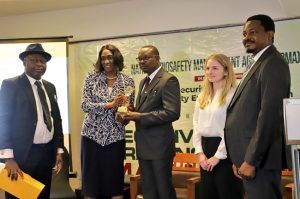Minister of State for Environment, Dr Ishaq Salako, has promised to explore latest advancements in bio-risk management to enhance safety in the environment.

Salako communicated this on Monday, November 6, 2023, in Abuja at the two-day Executive Leadership Training on Bio-risk management organised by the National Biosafety Management Agency (NBMA) and Health Security Partners.
He said that the training programme would offer the stakeholders the opportunity to explore the latest advancements in bio-risk management, delve into case studies, and engage in hands-on exercises to enhance collective capabilities.
“We will learn from one another; gain insights from renowned experts; and ultimately emerge as leaders who are better equipped to safeguard our environment and protect the well-being of our people.
“I want to stress the significance of a multidisciplinary approach to bio-risk management; bio-risk management is a subject of paramount importance in our rapidly changing world.’’
Salako added that the management of biological risks was no longer a choice, but a necessity given the challenges posed by emerging diseases, bio-terrorism threats, and the potential consequences of accidental laboratory releases.
“Our ability to effectively address these challenges relies on our collective commitment to education, preparedness, and strong leadership in this field.
“Today, as we embark on this journey of learning and collaboration, I want to emphasise the critical role that each of you plays in ensuring the safety of our environment, the health of our citizens, and the security of our nation.
“The challenges we face cannot be tackled in isolation; it requires a collective effort from scientists, regulators, policymakers and all those responsible for the safety of our environment and health,’’ he said.
The minister expressed optimism that by the end of the training, the stakeholders would be better prepared to meet the bio-risk management challenges of the present time with a clear vision of how to strengthen collective resilience.
On her part, Dr Agnes Asagbra, the Director-General, NBMA, said that the workshop would come up with the latest scientific advancements, best practices in regulation, and the sharing of experience of seasoned practitioners.
“Bio-risk management is not merely an academic or theoretical exercise; it is a real-world imperative that carries profound implications for the safety of our environment, the protection of human health, and the security of nations.
“In today’s rapidly changing landscape, it has become abundantly clear that our capacity to respond to bio-risks is a defining characteristic of our resilience and preparedness.
“I therefore stand before you with a sense of immense responsibility; one that reflects the gravity of the challenges we face, and the trust placed on us by our country and society.’’
Asagbra said that the meeting was necessitated due to the stakeholders’ understanding of the impact that bio-risks could have on ecosystems, economies, and the health and well-being of citizens.
“The mission we embark upon is noble; and the significance of our efforts cannot be overemphasised; the agency has the responsibility of putting in place measures to ensure biosafety and biosecurity.
“This executive leadership training has been meticulously designed to empower each and every one with the knowledge, skills, and insights necessary to mitigate the threats posed by bio-risks but to also lead with vision and purpose.
“I extend my sincere gratitude to Health Security Partners for their unwavering dedication to our shared mission; your continued support and collaboration over years is instrumental to this training,” she said.
More so, Prof. Jesse Uneke, Vice Chancellor of David Umahi Federal University of Health Sciences, Uburu, Ebonyi State, commended the agency for organising a workshop to brainstorm on ideas to move the agency forward.
He added that the agency was in the right direction and in tune with the present administration.
Rebecca Lyerly, the coordinator Health Security Partners, said the group was committed to partnering with the agency in the area of biosafety to ensure national security.
By Abigael Joshua
